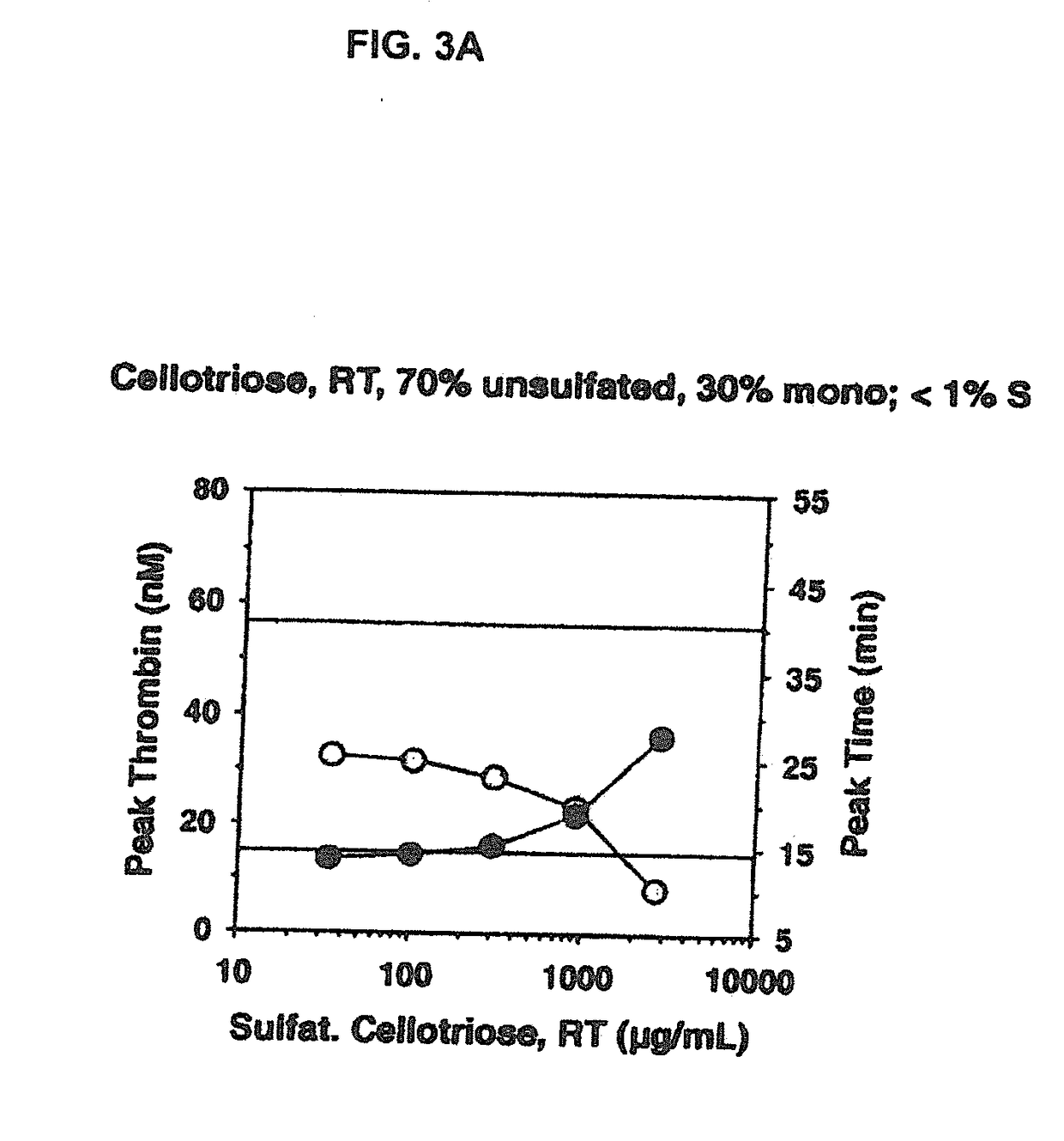Non-anticoagulant sulfated or sulfonated polysaccharides
a technology of non-anticoagulant sulfonate and polysaccharide, which is applied in the direction of sugar derivates, drug compositions, extracellular fluid disorder, etc., can solve the problems of ineffectiveness, inconvenient intravenous administration, and local bleeding, and achieve the effect of reducing the time of blood clotting
- Summary
- Abstract
- Description
- Claims
- Application Information
AI Technical Summary
Benefits of technology
Problems solved by technology
Method used
Image
Examples
example 1
[0209]For the sulfation, different sulfation reagents were used: SO3—NMe3, SO3-NEt3 and SO3-Py. Each of these reagents was tried for maltotriose, α-cyclodextrin and β-cyclodextrin under identical conditions to determine the most effective sulfation reagent. The general reaction characteristics were very similar for every reagent with only minor differences. SO3-NEt3 in DMF was chosen for use in the further experiments. In order to obtain a different degree of sulfation for each oligosaccharide the experiments were run at room temperature and at 70° C.
[0210]Literature procedures usually use Sephadex columns for the separation of the sugar components from the sulfation reagent and another Sephadex column or dialysis for cation exchange. Sephadex chromatography for the given oligosaccharides was unsuccessful, so a different protocol was established. The new protocol includes the precipitation of the saccharide components and the washing-out of the sulfation reagent with chloroform. In ...
example 2
[0225]The procoagulant activity of the sulfated polysaccharides was assessed by the Thrombin Generation Assay (TGA). The influence of each sulfated polysaccharide on thrombin generation was measured in duplicate via CAT in a Fluoroskan Ascent® reader (Thermo Labsystems, Helsinki, Finland; filters 390 nm excitation and 460 nm emission) following the slow cleavage of the fluorogenic substrate Z-Gly-Gly-Arg-AMC (Hemker H C. Pathophysiol Haemost Thromb (2003) 33(4):15). To each well of a 96 well microplate (Immulon 2HB, clear U-bottom; Thermo Electron) 80 μL of pre-warmed (37° C.) goat anti FVIII antibody treated human normal plasma pool was added. For triggering thrombin generation by tissue factor, 10 μL of PPP reagent containing a certain amount of recombinant human tissue factor (rTF) and phospholipid vesicles composed of phosphatidylserine, phosphatidylcholine and phosphatidylethanolamine (final concentration of 4 μM) (Thrombinoscope BV, Maastricht, The Net...
example 3
[0229]TFPI-dPT and aPTT
Dilute Prothrombin Time Assay with TFPI
[0230]A dilute prothrombin time assay with added TFPI (TFPI-dPT) was used to evaluate the TFPI-inhibiting effect of the different NASPs. Pooled normal human plasma (George King Biomedical, Overland Park, Kans.) was pre-incubated with 0.5 μg / mL full-length TFPI (aa 1-276, constitutively produced by SKHep1) and the respective NASP (0-5 μg / mL) for 15 min at RT. TF reagent TriniClot PT Excel S (Trinity Biotech, Wicklow, Ireland), diluted in Hepes-buffered saline 1:200 with 0.5% BSA was added to the plasma samples on an ACL Pro Elite hemostasis analyzer (Instrumentation Laboratory, Bedford, Mass.). Clotting was initiated with 25 mM CaCl2. The volume ratio of plasma:TF:CaCl2 was 1:1:1.
[0231]For data analysis, TFPI-dPT is plotted against the log concentration. Half maximal effective concentrations (EC50) values are determined using a sigmoidal curve fit.
Activated Partial Thromboplastin Time Assay (aPTT)
[0232]The aPTT assay was p...
PUM
| Property | Measurement | Unit |
|---|---|---|
| temperature | aaaaa | aaaaa |
| molecular weight | aaaaa | aaaaa |
| molecular weights | aaaaa | aaaaa |
Abstract
Description
Claims
Application Information
 Login to View More
Login to View More - R&D
- Intellectual Property
- Life Sciences
- Materials
- Tech Scout
- Unparalleled Data Quality
- Higher Quality Content
- 60% Fewer Hallucinations
Browse by: Latest US Patents, China's latest patents, Technical Efficacy Thesaurus, Application Domain, Technology Topic, Popular Technical Reports.
© 2025 PatSnap. All rights reserved.Legal|Privacy policy|Modern Slavery Act Transparency Statement|Sitemap|About US| Contact US: help@patsnap.com



